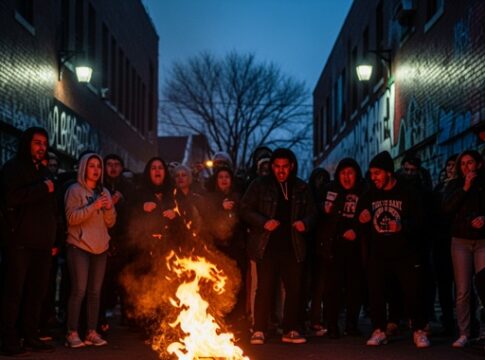One book, a crowd divided, and a city’s nerves set alight—Dearborn’s Quran-burning standoff reveals the raw fault lines of America’s eternal struggle between free speech and communal respect.
Dearborn’s Demographics Make It a Lightning Rod
Dearborn, Michigan, stands apart for its dense Arab-American and Muslim population, a magnet for both cross-cultural celebration and, as proven again, targeted provocation.
The city’s history of interfaith dialogue has often been overshadowed by outside activists seeking to incite. Jake Lang and his anti-Islam group chose Dearborn precisely for its symbolism, knowing a Quran-burning there would reverberate far beyond city limits. The pattern is familiar: outsiders arrive, intent on spectacle, as locals brace for impact.
The November 18, 2025, protest followed a predictable playbook but with higher stakes. As the group assembled, they flaunted bacon and rhetoric, taunting counter-protesters in broad daylight. The Quran, already a flashpoint in American culture wars, became a literal target, an act choreographed to provoke not just anger but a visceral defense of faith and belonging. For many Dearborn residents, the assault wasn’t just on a book, but on their very place in the American story.
Police Walk a Razor’s Edge: Order, Rights, and Reality
Dearborn’s police force faced a dilemma with no easy script. Officers moved decisively to prevent the Quran from burning, physically separating groups and issuing urgent calls for residents to disengage. The restraint shown by both authorities and—after initial scuffles—most community members likely averted a wider crisis, but the tension was palpable, broadcast live across social media and national news.
Law enforcement in Dearborn has a well-earned reputation for managing protest flashpoints, and this event was no exception.
Free Speech, Hate, and the American Experiment
The Dearborn standoff is the latest chapter in an ongoing American debate: Can a diverse society tolerate deliberate provocation in the name of free expression, or must there be boundaries when speech targets faith and identity?
Legal experts point to the First Amendment’s broad protections but acknowledge the real-world consequences when those protections collide with community harmony. Civil rights advocates warn that banning protest sets a dangerous precedent, yet community leaders insist that dignity cannot be optional in pluralistic America.
The event’s fallout is already visible. Dearborn authorities are reviewing protest permit protocols. Local activists are organizing resilience forums, while national pundits weigh in from all sides, some demanding tougher laws, others celebrating unfiltered speech.
The city’s businesses, bracing for potential boycotts or backlash, worry about the economic ripple effects if unrest becomes routine. For Dearborn and the nation, this story is far from over—every confrontation like this one nudges the boundaries of what America is willing to tolerate.
Who Controls the Narrative, Who Sets the Rules?
Stakeholders in Dearborn’s drama each see themselves as guardians of principle. Jake Lang’s camp claims to defend American liberties, framing their actions as a test of constitutional mettle. Dearborn’s Muslim community, steeled by years of similar provocations, insists on the right to live—and worship—without harassment. The police, caught between legal obligations and community trust, walk a line that grows thinner with every confrontation.
Nationally, such incidents ripple outward, fueling social media storms, cable news debates, and legislative posturing. The question for Americans, especially those who cherish both liberty and order, is not just how to handle the next flashpoint, but what kind of society each provocation is shaping. In Dearborn, the answer is being written—sometimes in shouts, sometimes in silence, always under the watchful eyes of a nation uneasy with its own contradictions.

